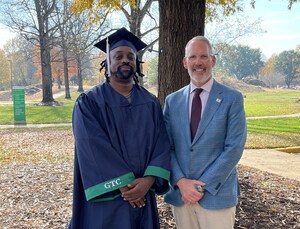
Community Takes Action on Manufacturing Skills Gap
Greenville Technical College Proposes Comprehensive Manufacturing Campus
GREENVILLE, S.C., Aug. 19, 2013 /PRNewswire-USNewswire/ -- Upstate South Carolina is home to some of manufacturing's best-known names as well as up-and-coming entries to the field: BMW, Bosch Rexroth, GE, Michelin, ADEX Machining Technologies, and more. These are some of the names that have made their needs known to Dr. Keith Miller, president of Greenville Technical College. From those needs and continued input, the idea for an Enterprise Campus came to be.
Now the effort faces a critical juncture. On August 20, Greenville Technical College goes before Greenville County Council seeking bond funding. The request, for $25 million, is significant, but the need and the opportunities are, too. Manufacturing in the U.S. is gaining strength. In Greenville, South Carolina it's especially strong, first in total earnings for all industries, and employing over 28,000 people who earn an average annual salary of $60,540.
Many area manufacturers have characterized the need for more skilled workers as critical. Even though the recession left many people ready for work, their skills weren't adequate. To help companies compete globally, they need a flexible, highly-skilled workforce equipped to maximize new technologies, adapt to evolving production processes and work organization models, and solve problems rapidly.
The long-term impact of not being able to find this skill set is predicted to have devastating economic consequences for existing manufacturers. At the same time, some leaders say, the economic development race will be won by communities that offer the services manufacturers need. In order to attract and retain manufacturers, Greenville must respond to requests from industry. The community can do this by creating the skilled workforce companies need, offering incubation space that helps companies start up or relocate, and providing flexible space where manufacturers can create prototypes and teach their current employees new skills to keep them on the cutting edge of improvements in technology.
The job openings manufacturers seek to fill aren't the same jobs people remember from years ago. In an area that once relied heavily on textiles, manufacturing, to many South Carolinians, means repetitive tasks performed in a dirty environment. They haven't seen what a modern shop floor looks like, and they aren't encouraging their children to take a look at this career opportunity.
A huge wave of retirements is coming to Greenville manufacturing soon. According to Census Bureau data, 22.6% of the workforce is 55+. That wave isn't being offset by an influx of young people. In fact, a Manufacturing Institute study shows that among 18 to 24 year olds, manufacturing ranks last among industries of choice for new careers.
Area manufacturers including Michelin, GE, Bosch Rexroth, ADEX, League Manufacturing, Fabri-Kal, SpecFab Services, Master PT, AMAMCO Tool, Standard Motor Products and more have voiced strong support for the Enterprise Campus project and high hopes for a favorable vote from County Council. The Greenville Chamber of Commerce has also spoken out in favor of the project citing per capita personal income in Greenville of $35,038, which lags other cities in the state as well as the national average of $43,169. Manufacturing, Chamber officials say, has the potential to raise income and benefit every business in the area, but only if it is supported.
Creating the environment to make this happen, college planners say, requires more than renovating existing office space. Envisioned is a campus that includes academic and lab space, room where entrepreneurs can develop new ideas and grow new companies, observation areas where young people can see advanced manufacturing in action, meeting rooms where economic development officials and business and industry can come together, and more.
A site selection firm is considering a number of locations across the county. Some of these sites will require demolition of an existing building, asbestos abatement and site remediation, construction of a lengthy access road possibly requiring a bridge, and construction of a parking garage. Since site attainment depends upon funding, and some of the top location choices may be unavailable once funding is secured, cost estimates are based on the most difficult building conditions of the sites under consideration.
Establishing a campus means developing roads as well as guard rails and sidewalks. New construction will be required for the initial building because of the equipment involved. A larger footprint and additional site preparation will be needed because of the building's purpose as a manufacturing facility housing heavy equipment on the first floor. A reinforced floor and individual concrete pads for each piece of equipment are required. Infrastructure must be in place to move large machinery in and out. Other requirements, not easily acquired through renovation, include additional electrical service, a fire suppression system, adequate exhaust for welding labs, a clean room, IT infrastructure, signage, parking facilities, and sound baffling to mitigate noise impact on neighbors.
The project is depending upon local funding to move forward. Once that milestone is passed, the college plans to seek assistance from the state to expand the project so that the Enterprise Campus can benefit additional students and offer a wider range of services to business and industry.
As manufacturers and college officials face the vote, they believe that if the area misses this opportunity, it will pay a price. "Without this support for manufacturing, I am concerned about the conversation we'll be having ten years from now," said Miller, the college's president. "I believe that if we don't find a solution to the needs we're hearing now, we'll have a skills gap that's become even more crippling, companies that decided not to locate here, and other companies that went under because they couldn't find a skilled workforce."
Manufacturers await County Council's vote. "If this vision is realized, this region can secure the current competitive status of the existing manufacturing base and also continue to grow this base with new businesses," said Mike McCormick, plant manager with Bosch Rexroth.
Numbers of note:
- $60,540 – the average salary of a Greenville County, South Carolina worker in manufacturing
- $43,169 – national per capita personal income
- $35,038 Greenville, SC per capita personal income
- 22.6% -- the percentage of the local workforce that is 55+
- less than 5% -- the percentage of Upstate manufacturing workers who are 24 years of age or younger
- Last place – where many young people rank manufacturing as a career choice
About Greenville Technical College
Greenville Technical College is a four-campus system where nearly 30,000 students are annually preparing for the strongest careers of today and tomorrow. Established in 1962, the college's mission is to drive personal and economic growth through learning. With more than 100 curriculum program choices along with short-term training for career and personal development, Greenville Technical College gives employers a ready supply of skilled workers and provides students with an education that will help them succeed. First accredited by the Southern Association of Colleges and Schools Commission on Colleges in 1968, the college's accreditation was recently reaffirmed for a ten-year period – the maximum time period possible. Regional accreditation allows students to transfer easily and gives employers assurance that job candidates from Greenville Tech have received a quality education.
For more information about Greenville Technical College and its programs, professors and partnerships, visit www.gvltec.edu.
Contacts: Becky Mann, 864.250.8305 or [email protected], Joshua Friesen, 864.250.8994 or [email protected]
SOURCE Greenville Technical College





Share this article